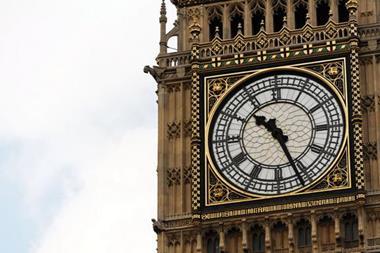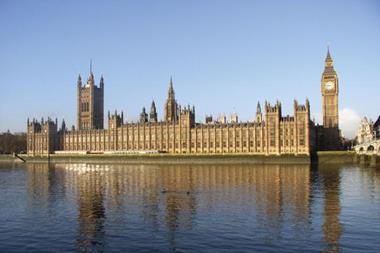New UK bribery laws could reverberate around the globe. Catriona Munro writes
The current laws on bribery in the UK are outdated and not fit for purpose in the modern global business world. If, however, the Bribery Bill now before Parliament makes its way to the statute books in the next year or so, the UK will have one of the world’s most far-reaching anti-bribery regimes, with consequent high risk for businesses caught within its scope.
There are two key weaknesses in the current laws on bribery. The first is that the laws do not catch bribes paid overseas by UK companies, where they use non-UK intermediaries to make the payments to officials or others. The second is that it has proved virtually impossible to prosecute companies for bribery. Prosecutors must prove that the company had a "controlling mind", normally a director, who was responsible for the bribery. To date, successful prosecutions have been few and far between: the UK authorities have notched up only one conviction for foreign bribery while the US authorities had 38 enforcement actions in 2007 alone.
It is for these reasons that the UK has been criticised for lagging behind its peer group. To stand a realistic chance of producing a level playing field for global business to operate without corrupt practices, there needs to be no chink in the international legal armoury through which they can slip. All countries share a responsibility to tackle this problem and so various international conventions have been established to encourage multilateral cooperation in this area.
As long ago as 1997, the UK signed up to the OECD Convention on Combating Bribery of Foreign Officials in International Business Transactions. This convention requires signatories to introduce legislation making it a criminal offence to bribe a foreign public official with a view to obtaining or retaining business, or otherwise gaining improper advantages. While some 140 countries have signed the OECD Convention and most have implemented it and introduced further national provisions the UK has done the bare minimum, merely tweaking existing law, with its inherent defects, rather than overhauling it. Various other international obligations to which the UK has put its name require it to tighten up the law, yet it has dragged its heels until now.
Meanwhile, most EU member states have specific laws prohibiting the giving and receiving of bribes in both the public and private sectors. For the most part, they have more robust laws than the UK’s, prohibiting the bribery of foreign public officials as required by the various conventions. Many member states have already extended liability to cover the giving or receiving of bribes by companies. Most EU countries have introduced the effective and dissuasive sanctions envisaged by the conventions, with individuals potentially facing up to 10 years' imprisonment. In Greece, the maximum penalty is a life sentence.
The new Bribery Bill, which had its First Reading in the House of Lords on 19 November 2009, seeks to address the weaknesses in the UK regime. It is anticipated that this Bill will become law in 2010, covering the whole of the UK (although the Scottish Parliament’s consent will be needed for this, as it amends devolved Scottish criminal law). The Bill is far-reaching and radically overhauls the current law. It presents real compliance challenges to companies and will mean the UK has some of the toughest laws in this field, extending well beyond fulfilling the UK's international obligations.
The Bill sets out two general offences, which essentially prohibit giving or receiving a bribe, also known as active and passive bribery. The offences are committed if the giving or receiving of the bribe gives rise to, or encourages, the improper performance of a function or activity. This activity may be of a public nature, or connected with a person’s business or employment, or could even be an activity performed on behalf of any body of people, such as a social club. A significant feature of the Bill is that bribes given to private individuals or businesses are also prohibited.
The new law will also introduce a corporate offence of failure to prevent bribery by someone acting on the company's behalf. The offence will be able to be committed by organisations incorporated in England, Wales, Scotland or Northern Ireland, and even those doing business in these countries that are incorporated elsewhere.
Indeed, the wide geographic coverage of the new law which will extend beyond the UK is among its most significant aspects and greatly increases the need to manage compliance risks for both companies and individuals. Central to this, the Bill creates a specific new offence of bribing a foreign public official, with the intention of obtaining or retaining business, or an advantage in the conduct of business. In addition to jurisdiction to prosecute anyone committing bribery in England, Wales or Northern Ireland, the draft Bill provides extra-territorial jurisdiction to prosecute bribery committed abroad by anyone with a close connection with the UK. This includes both companies incorporated in and individuals ordinarily resident in the UK, in addition to British citizens.
The scope of the corporate offence of failure to prevent bribery goes still further: organisations conducting business in the UK will be caught, even if they are incorporated in another country and the act of bribery takes place outside the UK. To date, the US Foreign Corrupt Practices Act (FCPA) is recognised as the furthest reaching national legislation. The FCPA penalises bribes made by US citizens and issuers, including companies listed on the New York Stock Exchange, even if the bribe is given and received outside the US. The UK Bill will reach at least as far. A French company which pays a bribe in the Far East could be caught under UK law if it has some, even insignificant, operations in England.
This is wider than is required by the OECD Convention and goes beyond the provisions found in most EU member states, where bribes paid by citizens abroad are only caught under national law if the act also constitutes an offence in the other country. The Director of the UK Serious Fraud Office (SFO) has welcomed this wide jurisdiction, saying it creates a level playing field internationally. The SFO envisages entering into prosecution agreements and liaising with foreign law enforcement agencies on an ad hoc basis, leaving companies uncertain as to where they are likely to be prosecuted.
As a result of the new Bill, the UK will have tougher laws than many of its European counterparts. The extraterritorial provisions in many European laws only apply to citizens or residents of that country, whereas the UK provisions will also apply to companies giving or receiving bribes abroad. Acts committed wholly abroad can also be caught by UK law, whereas in some European countries there is a requirement that part of the act is committed there.
In addition, the UK is preparing to take a tougher stance on penalties than its neighbours. Individuals found guilty will face up to 10 years in prison, while companies will face unlimited fines. Many European countries make a distinction between the penalties applicable to bribery in the public and private sectors. In France and Germany, the punishment for bribery in the public sector is a maximum of 10 years in prison, which is double that applicable to the private sector. The UK’s new regime will apply across the board with equal severity.
So, what should companies be doing to manage their risk? An organisation can escape liability if it can show it has adequate systems in place to prevent bribery, even if these failed in the particular instance. This underlines the requirement for businesses to embed anti-bribery responsibilities throughout their organisation, with changes in behaviour driven from the top.
Unambiguous and robust ethical policies should be introduced, making it clear that no bribes should be given or accepted. All employees, including managers and directors, should be given regular training on policies and procedures and be made aware that failure to comply will not be accepted. Policies on sensitive areas such as corporate hospitality should be especially considered and made clear to employees.
Internal controls should include clear written designation of authority and accountability for various issues, such as the authorisation and making of payments. Effective financial and accounting procedures are fundamental to any robust compliance system and will allow an organisation to track changes or unusual practices. Due diligence should be carried out on all proposed business partners and contracts: knowledge of the work and people involved is essential if corrupt practices and organisations are to be avoided.
All staff should be aware of the responsibility they each have for their own actions, as well as their potential liabilities. While there should be a designated person whose responsibilities include preventing bribery, every individual must comply with the organisation's policies. Appropriate and consistent disciplinary procedures should be in place to deal with any breach of anti-bribery policy or procedures.
An online training system, where staff can be regularly trained in the basics and which produces a strong audit trail, can be a very useful tool for implementing the company’s policy throughout the business.
The SFO has produced guidelines encouraging companies to report the discovery of corrupt practices as early as possible. The advantage to companies of doing so is the possibility of civil, rather than criminal, penalties. Instead of a criminal conviction, a company might have any property obtained through bribes or corruption recovered by the Serious Fraud Office. If a company is to be able to take advantage of these sorts of arrangements, it needs to know about the problem. That is a good reason to have an effective and well-publicised whistle-blowing policy in place to allow for unhindered disclosure of corrupt practices by employees. Organisations must not penalise employees for reporting such conduct and they should make sure harassment, victimisation or dismissal do not follow disclosure. Investigations must be appropriate, thorough and deal with the conduct disclosed. If illegal conduct comes to light, the company needs to think and act quickly to mitigate its exposure, possibly by self-reporting.
With these proposals, the UK will no longer be the weak link in the European drive to curb corruption. Already there are signs - even under the existing law - of tougher enforcement. Last year, Mabey & Johnson became the first UK company to be prosecuted in England and Wales for overseas corruption. The British bridge-building company pleaded guilty to 10 charges of corruption, bribery and breach of UN sanctions in Ghana, Iraq and Jamaica in July 2009 and was later fined £3.5m. In October, after five years of investigation, the SFO referred its investigation into BAE Systems to the Attorney General for a decision on whether to prosecute. There is every reason to believe that the Bribery Bill, when it becomes an Act, will be far more than just window dressing. Companies should be thinking now about how to minimise their risk.
Postscript
Catriona Munro is a partner in the EU, competition and regulatory team at Maclay Murray & Spens LLP Catriona.munro@mms.co.uk




















No comments yet